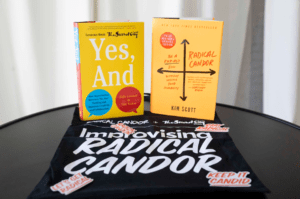Radical Candor Takes Practice — Improv Makes Your Practice Playful
In an article on Psychology Today, Dr. Clay Drinko, Ph.D., examines the brain activity while improvising (or being totally focused and present) and suggests how we can utilize improv thinking to make our work and daily lives richer. This is one of the benefits of our workplace comedy series The Feedback Loop and its accompanying learning materials that focus on how to use improv to practice Radical Candor.
“Like improv, Radical Candor provides a practical framework to help you develop conversational capacity in-the-moment, on the spot; building a practice you can use day to day, month to month and year to year,” notes Jason Rosoff, Radical Candor, LLC CEO and co-founder.
In fact, Kelly Leonard, executive director of insights and applied improvisation at The Second City and Second City Works, wrote a book about the benefits of improv titled, Yes, And: How Improvisation Reverses “No, But” Thinking and Improves Creativity and Collaboration–Lessons from The Second City.
“Through improvisation, teams take the time and space to practice exchanging direct and challenging feedback in a way that’s both caring and supportive,” says Leonard.
What is improv?
A common misconception is that improv is just making stuff up on the spot. But that’s only a small part of it. At its core, improvisation is a playful practice within a set of understood principles and a framework. The cornerstone of theatrical improv is the principle ‘Yes, and’, or the rule of agreement and building on an idea.
Improvisers must accept what the other scene partner is saying, without question, and add to it. Similar to how a jazz performer must focus on scales and signatures while improvising music, improv players must stay hyper-focused on each other to achieve successful collaboration, and therefore, a successful scene execution.
How does it work?
By studying the brain activity of jazz musicians, freestyle rappers, and theatrical improvisers, neurologists Charles Limb and Allen Braun found that while improvising, the side of the brain that controls language and creativity (medial prefrontal cortex, to be exact), lights up with activity. Simultaneously, the side of the brain that acts like our voice of doubt (dorsolateral prefrontal cortex), quiets.
The result? A perfect playground for collaboration and improvisation, free of self-doubt and overthinking.
Why does it matter?
As Drinko states, “improv offers the tools to practice a different kind of focus that can change our brains and unlock our individual and group potential and creativity.”
The skills at the heart of improv: active listening, collaboration, and creativity, Drinko states can serve as a lens to discuss ways to improve our lives across a variety of fields, or really, “any field that requires clear, collaborative communication.”
How to improv(e)
We like to say that improv is like yoga for your social skills. It’s a practice that you need to do every day to get better. But you don’t have to start taking improv classes or join a jazz band to improve, although it would help and be a lot of fun!
Think about improv as a mindset that is open to possibilities, others-focused, and totally in the moment.
And you can practice anywhere! For example, next time you are in a meeting or out to dinner with friends or playing with your kids, leave your phone behind and be present.
Try to hang on their every word and listen to understand versus listen to respond. It’s really difficult at first, but eventually you’ll train your brain to pay attention and focus without even trying.
(But word of warning, side effects of improv may include better collaboration, increased creativity, and more engagement in work and personal lives.)
A version of this article by Jenny Crowley, director of marketing at Second City Works, appeared on the Second City Works blog.
Improvising Radical Candor is a co-production of Radical Candor, LLC and Second City Works. By exercising Radical Candor through improvisation, teams learn the art of giving and receiving feedback while developing core improv fundamentals that emphasize skills like active listening, staying present and being others-focused.
Want to learn more? Get The Feedback Loop, our workplace comedy series and supporting learning materials, starting at $59 for our self-paced e-course.

